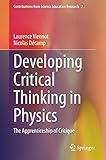Developing Critical Thinking in Physics [electronic resource] : The Apprenticeship of Critique / by Laurence Viennot, Nicolas Décamp.
Material type: TextSeries: Contributions from Science Education Research ; 7Publisher: Cham : Springer International Publishing : Imprint: Springer, 2020Edition: 1st ed. 2020Description: VII, 142 p. 55 illus. online resourceContent type: text Media type: computer Carrier type: online resourceISBN: 9783030437732Subject(s): Science education | Teaching | Critical Thinking | Science Education | Teaching and Teacher Education | Critical ThinkingAdditional physical formats: Printed edition:: No title; Printed edition:: No title; Printed edition:: No titleDDC classification: 507.1 LOC classification: LC8-6691Online resources: Click here to access online
TextSeries: Contributions from Science Education Research ; 7Publisher: Cham : Springer International Publishing : Imprint: Springer, 2020Edition: 1st ed. 2020Description: VII, 142 p. 55 illus. online resourceContent type: text Media type: computer Carrier type: online resourceISBN: 9783030437732Subject(s): Science education | Teaching | Critical Thinking | Science Education | Teaching and Teacher Education | Critical ThinkingAdditional physical formats: Printed edition:: No title; Printed edition:: No title; Printed edition:: No titleDDC classification: 507.1 LOC classification: LC8-6691Online resources: Click here to access online Chapter 1. Why critique ? Why physics? -- Chapter 2. Main reasons to call a text into question -- Chapter 3. Risk factors -- Chapter 4. Benefits and limits of a classification -- Chapter 5. Conceptual mastery and critical attitude: complex links -- Chapter 6. Activating criticism without delay -- Chapter 7. An education in critical analysis -- Chapter 8. Critique: a prelude to deeper comprehension -- Appendices A, B, C, D, E, F, G, H, I, J. .
This book promotes the effective implementation and development of critical analysis in physics. It focuses on explanatory texts concerning subjects typically dealt with in secondary or higher education and addressed in an academic or popular context. It highlights the general difficulties and obstacles inherent in teaching physics and shows how some tools can help to combine successful criticism and better understanding. The book examines the main reasons to call a text into question and looks at risk factors such as simplifications, story-like explanations and visual analogies. It takes inventory of the benefits and limits of critical analysis and discusses the complex links between conceptual mastery and critical attitude. The book ends by offering tools to activate critical thinking and ways for educators to guide students towards productive critical analysis.
